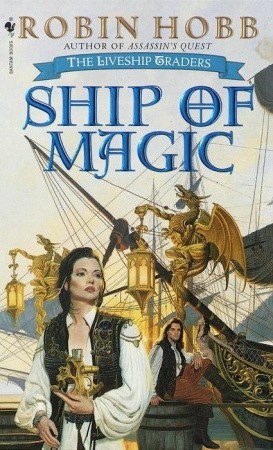Review: Robin Hobb’s “Ship of Magic”
by Miles Raymer
Robin Hobb’s Ship of Magic is an ambitious work of fantasy that doesn’t deliver on the promise of its good ideas. The novel takes place on “The Cursed Shores,” a colorful coastal landscape where swashbuckling and supernatural forces collide. Hobb’s crisp description and imagery bring The Cursed Shores to life, inviting the reader on a journey that would be captivating if not for a series of critical missteps.
Ship of Magic’s central world-building element is as good as any I’ve encountered in the fantasy genre. The economics of The Cursed Shores are heavily influenced by the presence of “liveships,” which are crafted from “wizardwood.” After being commissioned by a family and absorbing the spiritual energy of several deceased family members, each of these special vessels “quickens” into life and forms a unique bond with the family whose sweat and blood literally generated its consciousness. Once quickened, the figureheads of liveships begin to talk, exhibit emotions, develop their own culture, and also possess powers that generally make them superior seafarers compared to non-liveships.
Ship of Magic kicks off with the quickening of the Vivacia, a liveship commissioned three generations earlier by the Vestrits of Bingtown. The Vestrits are a well-respected Trader family, but also deeply in debt from their original investment in the liveship, substandard performance of their land-holdings, and increasing competition from illegal slave labor. In a desperate attempt to salvage the family’s fortunes, the newly-quickened Vivacia is turned over to an ambitious and unscrupulous son-in-law rather than to its seemingly-natural inheritor, Althea Vestrit. In the wake of this tragedy, winning the Vivacia back at any cost becomes Althea’s singular goal.
Althea is a serviceable if not inspired protagonist––a spunky, hot-headed young women who won’t let stuffy traditions get in the way of her dreams. Her journey blankets the book in a familiar fog of social subversion, syncing nicely with Hobb’s other thematic concerns: The harmful effects of sexism and slavery, the consequences of religious naivety, the harsh realities of finance, and the unpredictable role of luck in human life.
This fictional voyage, which begins with clear skies and favorable winds, quickly peters out into a monotonous episode of cabin fever. None of Hobb’s main characters prove themselves anything more than slightly-modified cliches with highly-predictable character arcs. Far too many pages are inexplicably devoted to characters too dull or obnoxious to merit much attention, while other, more engaging characters get short shrift. On the whole, Hobb fails to match her world’s creative energy with the quality of characters it deserves. There is also a serpent-driven plot thread that doesn’t tie into the greater narrative until the very end, and even then in a way that I found totally unsatisfying.
This 800+ page novel’s “climax,” while genuinely intriguing, would count as merely rising action in a tighter, less excessive book that valued its reader’s time. Worse still, this is just the first in a trilogy, which means I’ll have to take on another two books of similar length to learn how it all turns out. This would be worth it for a cast of characters I loved, but toward the end of Ship of Magic I experienced the sad realization that I didn’t care about the fates of anyone. It is difficult to articulate exactly why my dominant feeling toward these characters is apathy, but all I can say is that the book left me with a profound sense of relief that it was over, and almost no desire to find out what happens next. I think Ship of Magic would prove (and has proved) enthralling for the right audience, but to me it was a disappointment.
Rating: 4/10

This is amazing. Keep reading and then let me know what you think at the end. I have personally never had such complex relationships with characters in novels nor seen so much development and change from them overtime.
That is a hell of an endorsement, Jessica! It is hard for me to imagine wanting to dive back into this series right now, but since I respect your recommendations so much I will keep it on my radar, and maybe take it up again in the future.